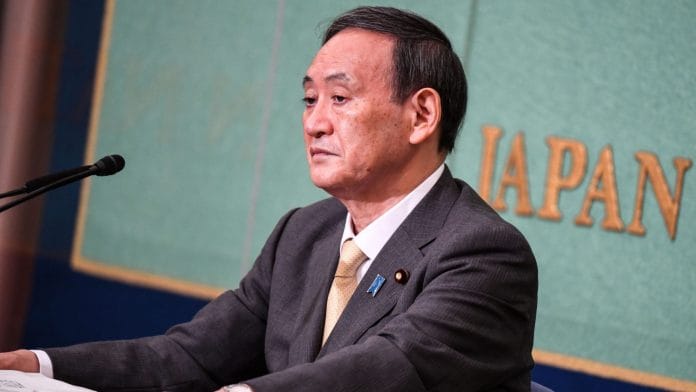Tokyo: Japanese Chief Cabinet Secretary Yoshihide Suga is expected to win an election Monday for leader of the ruling Liberal Democratic Party, ushering in the country’s first change of prime minister in nearly eight years.
Suga’s appointment will bring to an end the record run of his ailing boss, Shinzo Abe, who has served since 2012 and forged an identity on the global stage that the world’s third-largest economy had often lacked. The LDP vote is set to start from 2 p.m.
The party, which has ruled mostly uninterrupted since 1955, will then use its parliamentary majority to install the winner as prime minister on Wednesday.
A farmer’s son long known as Abe’s back-room fixer, Suga is set for an overwhelming victory in the party election, according to public broadcaster NHK, which cited its own survey. While Suga headed into a three-way race with little voter support, media polls show the public has also begun to swing behind him.
Suga, 71, is likely to win at least 52 of the 141 votes allocated to regional party branches, and about 70% of the 394 votes allotted to party lawmakers, NHK said. That would give him more than 60% of the 535 votes up for grabs, handing him an outright majority in a contest that includes former Defense Minister Shigeru Ishiba and former Foreign Minister Fumio Kishida.
Even before Suga declared his candidacy on Sept. 2, he had the backing of five of the party’s seven factions and enough votes lined up to win. The only factions that didn’t back him were the ones led by the other contenders — Ishiba, with 19 members, and Kishida, with 47.
General election
Meanwhile, Finance Minister Taro Aso stoked speculation about an early general election, saying it could happen “soon” to legitimize the new administration, Kyodo News reported. While Suga has repeatedly said the public doesn’t want to go to the polls during the coronavirus pandemic, a surge in support for the cabinet gave rise to ideas the new premier would call one in the near future.
Suga inherits an economy in a grim state as Covid-19 reverses many of the gains of the past few years, effectively closing down what had been a growing inbound tourism industry. He has pledged to fight the virus while helping businesses stay afloat.
Suga has said he will continue the signature ultra-easy monetary policy of the current premier, dubbed “Abenomics.” He has added that more should be done on monetary and fiscal policy, if needed to protect jobs and companies during the current virus crisis. Suga has said reviving the economy should be prioritized over tackling debt at this point.
Any sign of a departure from the path of Abenomics could send the yen surging and stocks sliding, triggering a re-evaluation of the outlook for the nation.
Though Suga is largely seen as a continuity candidate, he has been outspoken on some issues, including the need for more competition among mobile phone providers. He has said Japan has too many regional financial institutions, and is a strong proponent of introducing casino resorts to bolster tourism.
While Suga has little direct experience in diplomacy, he has said that Japan’s alliance with the U.S. will remain the cornerstone of its foreign policy. He also referred in a policy pamphlet to maintaining relations with neighboring countries, especially its largest trading partner China.
“Even if the leader changes, we cannot afford to change our posture with the United States. Being surrounded by North Korea, China and Russia, the U.S-Japan relation has to be the cornerstone of our foreign policy,” Ichiro Fujisaki, a former Japanese ambassador to the U.S., told Bloomberg Television. – Bloomberg
Also read: With not a single female candidate to replace Abe, Japan’s women still waiting to ‘shine’






